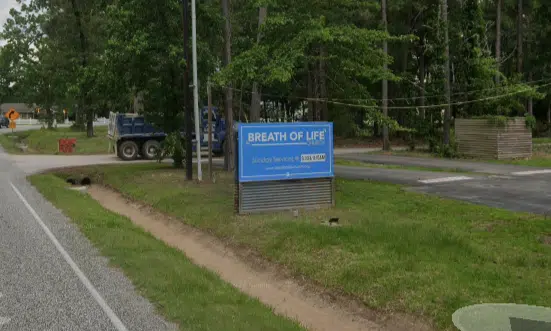
A worship leader affiliated with the Breath of Life Church located at 28100 Robinson Rd # A, Conroe, TX 77385, has been taken into custody, accused of sexually abusing a young girl who attended the same congregation. Sean Carroll Aveilhe faces charges of aggravated sexual assault of a child, with his bond set at $100,000, according to Click2Houston.
According to the Montgomery County Precinct 3 Constable’s Office, the investigation began after a report was filed on Tuesday, prompting authorities to act swiftly. The victim disclosed details of the abuse during an interview at Children’s Safe Harbor in Conroe, a facility specializing in working with young survivors of trauma.
On January 30, law enforcement executed a search warrant at a residence in Conroe as part of efforts to gather further evidence. Shortly thereafter, Aveilhe was arrested and booked into the Montgomery County Jail.
Authorities are urging anyone with information relevant to the case to contact the Montgomery County Precinct 3 Constable’s Office at 281-364-4211 and request to speak with the lead detective. The investigation remains ongoing as officials work to uncover all details surrounding these allegations.

Victims of clergy sexual abuse often face immense challenges when deciding to come forward, especially in cases involving trusted community figures. To provide clarity on the legal rights available to survivors and the steps they can take to hold individuals and institutions accountable, we spoke with Anjali Nigam, a seasoned Texas attorney specializing in sexual abuse cases. In this conversation, she outlines how victims can navigate the legal system, seek compensation, and promote institutional change to improve safety for others.
Editor Darla Medina: Given the charges against Sean Carroll Aveilhe, what legal options are available for victims of sexual abuse in situations like this?
Attorney Anjali Nigam: Victims of sexual abuse have multiple pathways to seek accountability. In cases like this, there are criminal proceedings, which are handled by law enforcement and prosecutors, but victims can also file civil lawsuits. A civil case allows them to seek financial compensation for the trauma they’ve endured, particularly if negligence on the part of an institution—such as a church—played a role.
Medina: How might a church or similar organization be held accountable in a civil lawsuit?
Nigam: Organizations, including churches, have a responsibility to protect those under their care, especially minors. If it’s found that the church ignored warning signs, failed to conduct proper background checks, or didn’t take appropriate action after complaints were raised, they can be held liable for enabling or failing to prevent abuse. Civil lawsuits aim to address these failures and ensure that institutions implement better safeguards moving forward.
Medina: What steps should victims or their families take if they want to explore these legal options?
Nigam: The first step is to document everything. That includes keeping records of communications with authorities, medical or psychological evaluations, and any other relevant details. Next, they should reach out to an attorney experienced in handling sexual abuse cases. Legal counsel can guide them through the process, whether it’s working with law enforcement, filing a civil lawsuit, or connecting them with victim support resources.
Medina: Are there any challenges victims face when coming forward in these cases?
Nigam: Absolutely. Victims often fear stigma, retaliation, or not being believed, especially in cases involving respected community members. That’s why it’s important for families and communities to provide support and encouragement. The legal system can also be daunting, but with the right representation, victims can achieve justice and begin the healing process.
Medina: What message would you give to survivors of abuse who feel hesitant about coming forward?
Nigam: I want survivors to know they’re not alone. Their voices matter, and there are people ready to support them. Coming forward is incredibly brave, and while it’s not easy, it can bring accountability and prevent future harm to others.
If your family has been affected by sexual abuse involving a church worship leader, know that you are not alone. Legal options are available to seek accountability and justice for the harm caused. Our team is here to provide compassionate support and experienced guidance every step of the way. Contact us today for a free, confidential consultation to discuss your case and explore the steps you can take to protect your loved ones and hold negligent parties accountable.
 info@legalherald.com
info@legalherald.com